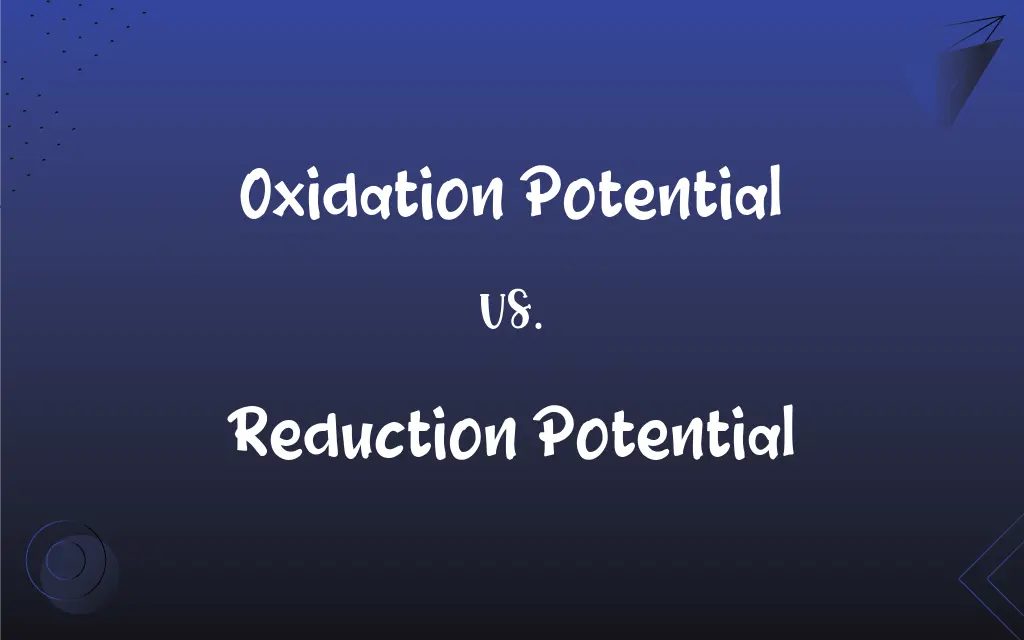Oxidation Potential vs. Reduction Potential: What's the Difference?
Edited by Aimie Carlson || By Janet White || Published on January 18, 2024
Oxidation potential measures the tendency of a substance to lose electrons, while reduction potential measures its tendency to gain electrons.

Key Differences
Oxidation potential represents the ease with which a species can be oxidized, or lose electrons. Conversely, reduction potential indicates how readily a species gains electrons, undergoing reduction. Both potentials are measured in volts and signify a substance's electron transfer capability.
In the context of electrochemistry, oxidation potential reflects the propensity of a substance to act as an oxidizing agent, donating electrons. Reduction potential, on the other hand, measures a substance's ability to function as a reducing agent by accepting electrons.
The oxidation potential is often considered in terms of positive values, where higher values indicate stronger oxidizing agents. In contrast, reduction potential is typically associated with negative values for strong reducing agents, although it can be positive too.
Oxidation potentials are crucial in predicting the outcomes of redox reactions, determining which substances will oxidize. In similar vein, reduction potentials are essential for understanding which substances are more likely to undergo reduction.
In an electrochemical cell, the oxidation potential at the anode and the reduction potential at the cathode determine the cell's overall voltage. This reflects the combined tendencies of substances involved in the cell to either lose or gain electrons.
ADVERTISEMENT
Comparison Chart
Electron Transfer
Loss of electrons
Gain of electrons
Role in Redox Reaction
Acts as an oxidizing agent
Acts as a reducing agent
Typical Values
Positive for strong oxidizers
Negative for strong reducers
Electrochemical Cells
Related to anode potential
Related to cathode potential
Measurement
Indicates tendency to oxidize
Indicates tendency to reduce
ADVERTISEMENT
Oxidation Potential and Reduction Potential Definitions
Oxidation Potential
Oxidation potential measures how easily a substance loses electrons.
In a battery, the high oxidation potential of the anode material facilitates electron flow.
Reduction Potential
Reduction potential is a measure of a substance's electron accepting capacity.
Elements with high reduction potentials are often used in reducing agents in industrial processes.
Oxidation Potential
Oxidation potential is a measure of a substance's electron releasing capacity.
Elements with higher oxidation potentials are often used in oxidizing agents in chemical reactions.
Reduction Potential
Reduction potential measures a substance's affinity for gaining electrons.
The reduction potential of hydrogen ions drives the efficiency of fuel cells.
Oxidation Potential
Oxidation potential indicates the propensity for electron donation.
Metals with higher oxidation potentials are more prone to corrosion.
Reduction Potential
Reduction potential indicates the tendency for electron acceptance.
In electrolysis, substances with higher reduction potentials get reduced at the cathode.
Oxidation Potential
It reflects the ability of a species to act as an oxidizing agent.
Chlorine's high oxidation potential makes it an effective disinfectant.
Reduction Potential
It quantifies the likelihood of a substance undergoing reduction.
The reduction potential of a metal ion helps predict its behavior in electroplating.
Oxidation Potential
It quantifies the likelihood of a substance undergoing oxidation.
The oxidation potential of copper determines its reactivity in redox reactions.
Reduction Potential
It reflects the capacity of a species to act as a reducing agent.
A substance with a high reduction potential can easily reduce other substances.
FAQs
How are oxidation and reduction potentials measured?
Both are measured in volts, indicating electron transfer capabilities.
Does reduction potential influence electrochemical cell voltage?
Yes, it, along with oxidation potential, determines the cell's voltage.
What is reduction potential?
Reduction potential is a measure of how readily a substance can gain electrons.
Can oxidation potential predict redox reactions?
Yes, it helps predict which substances will oxidize in a redox reaction.
Can a substance with high reduction potential act as a strong reducer?
Yes, a high reduction potential indicates a strong reducing capability.
Do oxidation potentials always have positive values?
Typically, but they can have negative values in certain chemical contexts.
Are higher oxidation potentials indicative of stronger oxidizers?
Yes, substances with higher oxidation potentials are stronger oxidizers.
Are reduction potentials always negative?
They are often negative for strong reducers, but can be positive as well.
What is oxidation potential?
Oxidation potential is a measure of how easily a substance can lose electrons.
How does environmental pH affect these potentials?
pH can significantly influence both oxidation and reduction potentials.
Is there a relationship between oxidation and reduction potentials?
Yes, they are related and often compared to predict redox reactions.
Can these potentials be altered?
Yes, through changes in concentration, temperature, and pH.
Are oxidation and reduction potentials constant for a substance?
They can vary depending on the surrounding conditions and chemical context.
Do these potentials play a role in battery technology?
Absolutely, they are fundamental in determining battery efficiency and capacity.
How do these potentials relate to standard electrode potentials?
They are derived from standard electrode potentials under specific conditions.
What role does oxidation potential play at the anode of a cell?
It influences the electron loss and the reactions occurring at the anode.
How does reduction potential affect cathode reactions?
It determines the likelihood of electron gain and reactions at the cathode.
Can these potentials predict corrosion likelihood?
Yes, particularly the oxidation potential can indicate a material's susceptibility to corrosion.
Are oxidation and reduction potentials important in environmental chemistry?
Yes, they are key in understanding chemical processes in natural and polluted environments.
Can oxidation and reduction potentials predict cell reactions?
Yes, they are crucial in determining the direction and feasibility of cell reactions.
About Author
Written by
Janet WhiteJanet White has been an esteemed writer and blogger for Difference Wiki. Holding a Master's degree in Science and Medical Journalism from the prestigious Boston University, she has consistently demonstrated her expertise and passion for her field. When she's not immersed in her work, Janet relishes her time exercising, delving into a good book, and cherishing moments with friends and family.
Edited by
Aimie CarlsonAimie Carlson, holding a master's degree in English literature, is a fervent English language enthusiast. She lends her writing talents to Difference Wiki, a prominent website that specializes in comparisons, offering readers insightful analyses that both captivate and inform.







































































